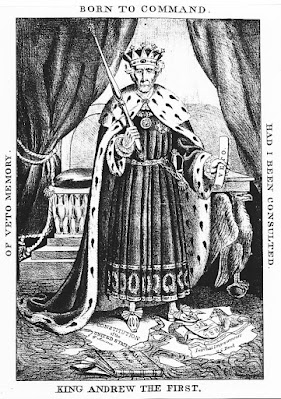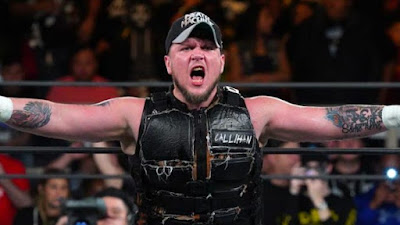The Election Of 1832: Andrew Jackson vs. Henry Clay vs. William Wirt vs. John Floyd
A supreme court case called 'Worcester v. Georgia' ruled in favor of the Cherokee Indians who were being pushed out the state and claimed that Georgia and other states attempting to do this was unconstitutional, however Andrew Jackson for a time was quoted in saying "John Marshall Has Made His Decision, Now Let Him Enforce It." but this has proven not to be the case.
Regardless, 45,000 Indians were forced to move from the states that they once called home in what has infamously been refer to as "The Trail of Tears" which actually occurred under the presidency of his successor.
While this move by Jackson may have endeared him even more to Southerners, his actions regarding tariffs certainly didn't and this would lead to his vice president, John C. Calhoun resigning from his position before the election, and it would lead to the Nullification Crisis but more on that a little later.
Due to this Jackson decided to run for re-election with Martin Van Buren, the co-founder of the Democratic Party and Secretary of State as his running mate.Opponents to Jackson claimed that his refusal to renew the charter for the Second National Bank would lead to horrendous consequences for the country on an economic level later down the road. Jackson on the other hand responded that by not renewing the bank, he was keeping the wealth out of the hands of elites who most certainly would've kept it all for themselves and used it to prevent his re-election.
As a result of Jackson's decision regarding the National Bank as well as his pension for vetoing a lot of legislation that came to his desk, many detractors claimed that Jackson was nothing more than a tyrant which led to political cartoons of "King Andrew" dressed as a monarch while also stepping all over the U.S. Constitution.
But were not done just yet as Andrew Jackson has another problem going on within his administration and the reason behind all of it comes back to the one thing that always seems to plague politicians: sex scandals.
The story goes that Peggy/Margaret was with a man by the name of John Timberlake but once he died, John Eaton who knew about the relationship between Peggy and Timberlake decides to marry the now widowed O'Neal.
The union of John and Peggy Eaton was supported by Andrew Jackson, which makes sense as Jackson himself was a widower after winning the presidency in 1828, however many people are not too happy about this due to Peggy's reputation of showing up at bars that usually had men and interacting with various people.
One of the biggest critics of Peggy Eaton was Floride Calhoun, the wife of John Calhoun and Floride tells all of the cabinet wives to not interact or socialize with the Eatons at all and many politicians follow suit.
This scandalous affair plus the backlash facilitated by Mrs. Calhoun results in John Eaton and Martin Van Buren stepping down from their positions within the administration before Andrew Jackson fires everyone else from his cabinet who refused to work with the Eatons (except for John Calhoun who resigned as previously mentioned) and Jackson ends up bringing in a new group of people made entirely out of Andrew Jackson's closest friends and advisors which included John Eaton and Martin Van Buren.
So, Andrew Jackson's first term has seen him deal with a conflict relating to the national bank, his fired everyone from his cabinet, his VP resigns, people in Congress hate him and there's a sex scandal to boot...Now amongst all of this, his going to have to run for re-election.
The biggest rival Jackson had to deal with around this time was the former Speaker of the House and Secretary of State, Henry Clay who was believed to be responsible for why Jackson didn't win the presidency in 1824 and blamed alongside with John Quincy Adams for causing the death of his wife Jackson's wife, Rachel.
Clay realizes that with Jackson now vulnerable amidst all these scandals, he could do what he wasn't able to do before and that's defeat Jackson and become president of the United States.
This election marked the first time in which political parties had nominating conventions to determine who would be the running on the party's ticket for president and Clay got the nomination for the National Republicans and his bringing along with him John Sergeant, a former U.S. Representative from Pennsylvania as his running mate.The Nullification Crisis stems from the passing of the Tariff of 1828, which increased the rates on imported goods by 60% and with many Southern states not investing into industry, they were the most affected by what they would call "The Tariff of Abomination".
Calhoun refused to run for president under the Nullifier Party and instead the party supported Virigina Governor, John Floyd to head their ticket as Floyd had disagreements with Jackson over a number of issues.
The Nullifier's only ran in the state of South Carolina, and they hoped to use Floyd's candidacy for president as a protest vote against Jackson's bid for re-election.
Much like James Madison in 1812, Jackson won despite having less of the popular vote in the next election.
Herny Clay received 49 electoral votes and 37.4% in another crushing defeat for the presidency as Andrew Jackson beats the man who screwed him out of the presidency in 1824.
William Wirt and the Anti Masonic Party don't favor too well either as they only receive 7 electoral votes, which was just the state of Vermont and 7.8% of the popular vote.
John Floyd won all of South Carolina's 11 electoral votes, but the state didn't have a popular vote going into this election; By the way the Nullification Crisis that created the whole Nullifier Party would be settle with the passing of the Compromise Tariff of 1833, which made the South Carolina happy and thereby ended the lifespan of the Nullifier Party.
And that was the election of 1832, a lot of twist and turns, scandals, third parties rising to the surface and an undisputed winner with Andrew Jackson winning another term thanks to the support of the middle class.
The Election of 1824: Crawford vs. Adams vs. Clay vs. Jackson
The Election of 1828 Andrew Jackson vs. John Quincy Adams
The Election Of 1828: Andrew Jackson vs. John Quincy Adams (blogofwrestling52.blogspot.com)
Be sure to follow me on Twitter @FullertonHakeem for more articles like this...see Ya.














Comments
Post a Comment